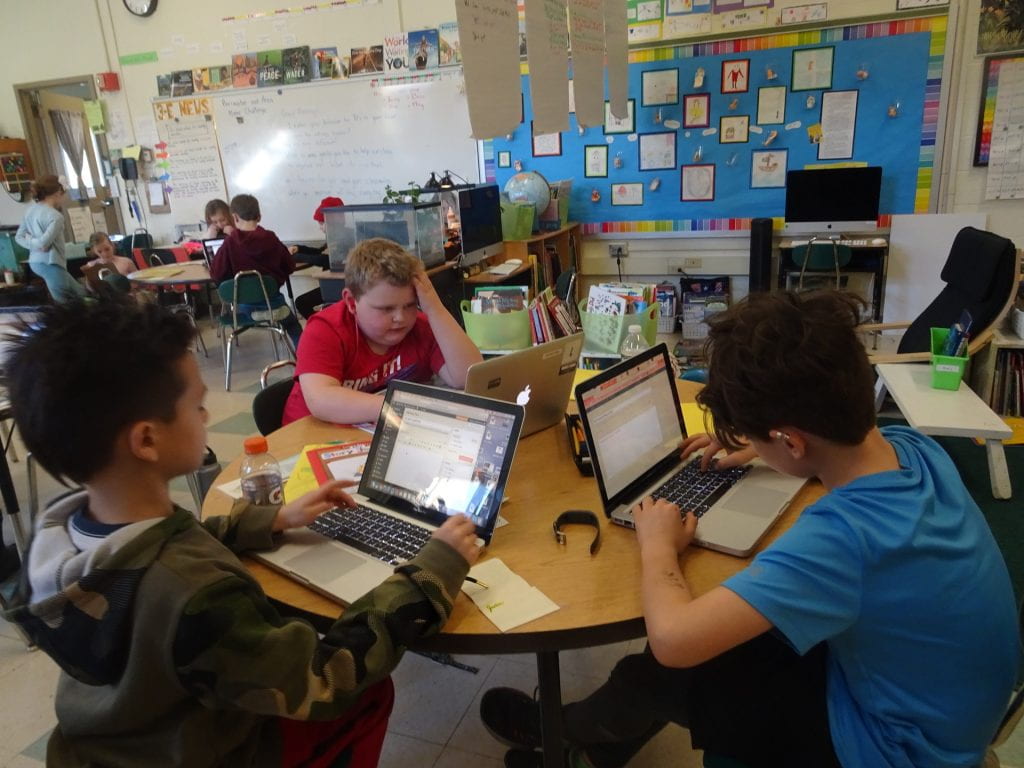 As I am preparing for conferences next week, I have again been stuck by what a huge growth year 3rdgrade is. Our curriculum is divided into grade spans. Third grade is the first year in the 3 to 5 span and what they are expected to accomplish is a lot. They are working hard to do that. I appreciate their attention and efforts.
As I am preparing for conferences next week, I have again been stuck by what a huge growth year 3rdgrade is. Our curriculum is divided into grade spans. Third grade is the first year in the 3 to 5 span and what they are expected to accomplish is a lot. They are working hard to do that. I appreciate their attention and efforts.
S.E.L. – Sorting and Dealing With Problems
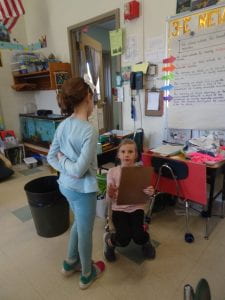 This week we’ve begun a new set of discussions about problems and behaviors. We’ve learned that dangerous and destructive problems are ones where you really need to get help. When you’re afraid you or someone else will get hurt you need to get help from an adult. When you see that things are being ripped and ruined you need to get help. We’ve also talked about “annoying” behavior as different from dangerous and destructive behavior. Our class definition of annoying behavior is that it is something that distracts attention from the appropriate task, is repetitive (not just once), and might be intentionally teasing.
This week we’ve begun a new set of discussions about problems and behaviors. We’ve learned that dangerous and destructive problems are ones where you really need to get help. When you’re afraid you or someone else will get hurt you need to get help from an adult. When you see that things are being ripped and ruined you need to get help. We’ve also talked about “annoying” behavior as different from dangerous and destructive behavior. Our class definition of annoying behavior is that it is something that distracts attention from the appropriate task, is repetitive (not just once), and might be intentionally teasing.
Dealing with annoying behavior is tricky and we’ll see if we can find ways to cooperate and compromise in our classroom so everyone feels comfortable, supported and heard. We hope we can all be respectful, and find ways to behave so everyone can happily do his or her best in the classroom.
Story Mountains
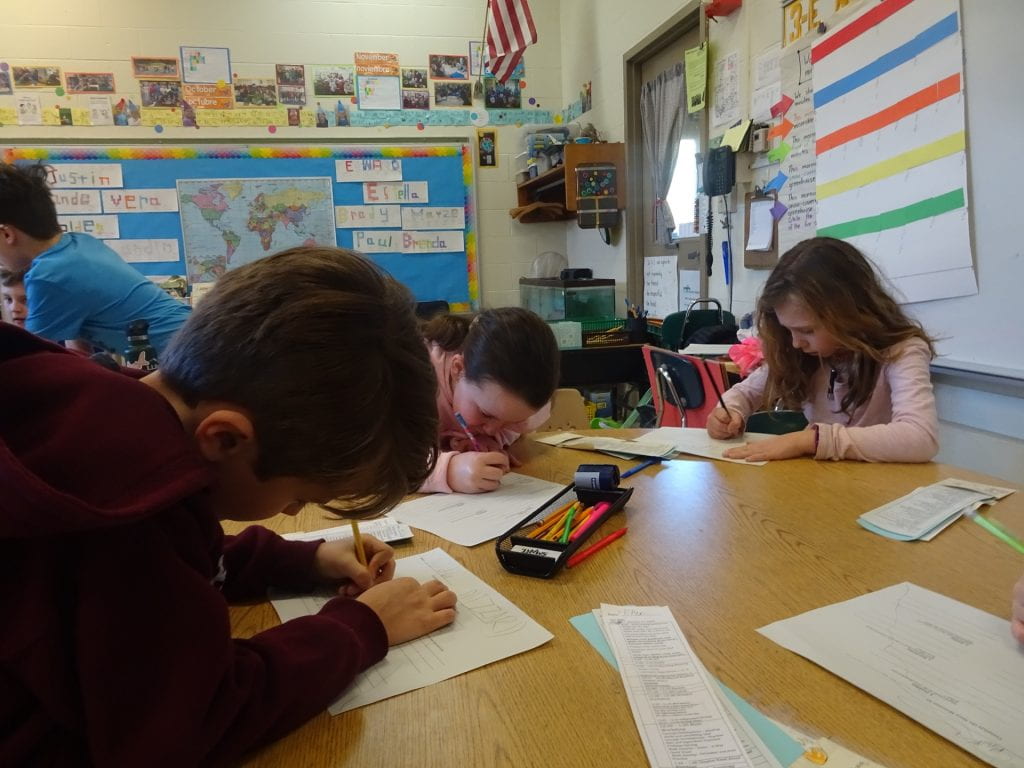 We’ve been exploring plot and the plot line of narratives. We’ve been climbing story mountains together and individually. We’ve been noticing how stories begin with a lead that establishes who the main characters are and initiates the main action. This is followed by a series of small events and descriptive details that build to the main problem. This problem is something that the characters have to deal with and find a way to get through it. The main character learns something or is changed when the problem is resolved. And finally, the story ends in a way that connects back to the beginning. The story has come full circle.
We’ve been exploring plot and the plot line of narratives. We’ve been climbing story mountains together and individually. We’ve been noticing how stories begin with a lead that establishes who the main characters are and initiates the main action. This is followed by a series of small events and descriptive details that build to the main problem. This problem is something that the characters have to deal with and find a way to get through it. The main character learns something or is changed when the problem is resolved. And finally, the story ends in a way that connects back to the beginning. The story has come full circle.
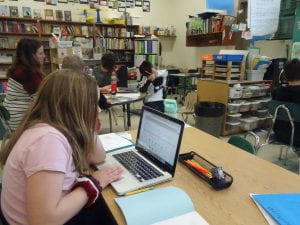 You’ll see a couple examples this work in your child’s folder this week. Some of the children easily follow the characters through the story. They connect with them and recognize how they are interacting with the action of the story. Others find it more challenging to follow the character’s growth throughout the story. When you are reading together, talk to you child about the story mountain found in the books you are sharing. It will strengthen his/her understanding of the story and build inferential comprehension skills too.
You’ll see a couple examples this work in your child’s folder this week. Some of the children easily follow the characters through the story. They connect with them and recognize how they are interacting with the action of the story. Others find it more challenging to follow the character’s growth throughout the story. When you are reading together, talk to you child about the story mountain found in the books you are sharing. It will strengthen his/her understanding of the story and build inferential comprehension skills too.
Furthering Our Use of Elaboration Strategies
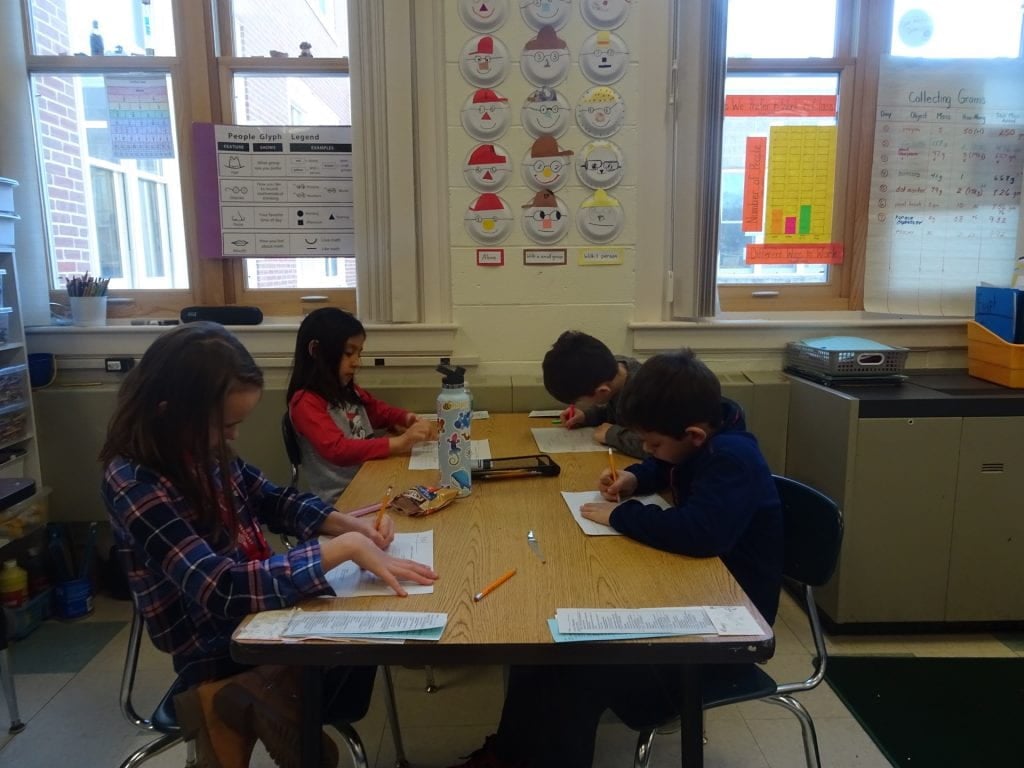 Earlier in the year we learned how to develop more descriptive sentences by adding adjectives, and details telling when, where, why and how. A simple sentence can become quite interesting. We also learned about the “power of 3” to help guide our choices because generally three is enough. Three adjectives, three actions, or three repetitions are enough to make the idea stick without becoming monotonous.
Earlier in the year we learned how to develop more descriptive sentences by adding adjectives, and details telling when, where, why and how. A simple sentence can become quite interesting. We also learned about the “power of 3” to help guide our choices because generally three is enough. Three adjectives, three actions, or three repetitions are enough to make the idea stick without becoming monotonous.
This week we’ve begun learning strategies to use to make our stories and informational writing more elaborate. So far we have practiced adding descriptive details to help readers develop a clearer picture in their mind of the setting. We’ve also learned how to add actions to animate the story. In our example a storm is coming and so we added sentences about the wind and people rushing to get out of the weather. We have two more strategies to learn: adding dialogue and introducing the characters’ inner thought to add emotion to our writing.
Bits and Pieces –
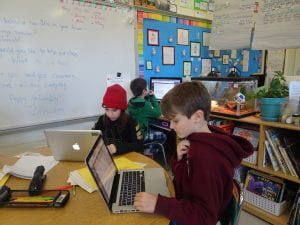 We are continuing to learn cursive. We are on our third set of letters – the Loop Group. Those letters are b, f, h, k, l and e. Most of the class is having fun learning cursive, though it is challenging.
We are continuing to learn cursive. We are on our third set of letters – the Loop Group. Those letters are b, f, h, k, l and e. Most of the class is having fun learning cursive, though it is challenging.- We are enjoying Winterhouse. We are still in the build up portion of the story. There are lots of characters and lots of details to keep track of.
- The children are researching their countries. They are learning about the geography and landforms, unique plants and animals, cultural celebrations and traditions, historic sites and landmarks and important museums, monuments or memorials. This week the children wrote letters asking question on their blogs. We hope to get some responses from around the world. If you have connections, please share.
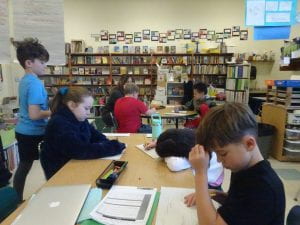 Our next science unit is weather and so we have been building our background knowledge and understanding by reading poems and books about their topic during our shared reading lessons.
Our next science unit is weather and so we have been building our background knowledge and understanding by reading poems and books about their topic during our shared reading lessons.- We have been learning about elapse time, equivalent fractions, and strategies for solving multistep problems. We play games to practice basic facts in all four operations and we’re learning about perimeter and area.
That was a fun week